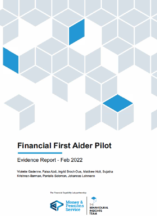People tend to ask friends or family for financial advice. Financial First Aiders (FFAs), employees who are trained to give guidance on financial matters, can give their colleagues another option to find help for money issues. This report summarises key learnings from a pilot project to test out the implementation of an FFAs initiative carried out at the Yorkshire Building Society (YBS). 20 FFAs were recruited and trained as part of the pilot. The evaluation of the pilot, which was funded by the Money and Pensions Service (MaPS) and run by the Behavioural Insights Team (BIT), aimed to provide information about how the FFA service works and its potential to scale. The evaluation was focused on the functioning of the FFA service and does not explore its impact on client outcomes.
Key findings about the pilot
The pilot successfully recruited volunteers
The pilot recruited 20 FFA volunteers from YBS employees. Key success factors for recruitment included that volunteers considered the FFA service to be highly relevant to employees and were encouraged to sign up by line managers. The FFA training was well received but could have been improved. The training content was developed under close collaboration between MaPS, YBS, and QSA and tailored to the volunteers’ experiences and skills. While the training was well received, FFAs felt that it didn’t prepare them well enough for the signposting aspects of the role.
Lack of promotion and relatability of the service, among other factors, hampered its uptake
Once the service was launched, promotion of the service was hampered by limited internal communication channels and the lack of relevant case studies. Lack of promotion was deemed to have limited uptake of the service substantially. Other factors contributing to limited uptake were the perception that case studies and FFAs were not relatable enough, perceived misalignments between the FFA service offering and employee needs (some of whom would have preferred receiving advice rather than just guidance), and low support for FFAs themselves.
Given that YBS is a financial services firm itself and employees are expected to be financially savvy, some potential beneficiaries were likely put off from using the service since doing so would effectively amount to admitting that they were not financially secure. COVID-related disruptions further complicated delivery, as sessions that were originally planned to be face-to-face had to be delivered in a digital format. Nonetheless, FFAs carried out a series of guidance sessions, with one particularly prolific FFA showing that the service had the potential to reach more employees. The service continues to be viewed as a valuable component of YBS’ broader wellbeing offering.









